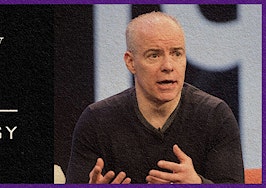For the second consecutive quarter, Realogy posted record revenue numbers as the hot housing market propelled the company to a huge year, during which the nation’s largest real estate holding company tallied more than $500 billion in closed sales volume.
But the COVID-19 pandemic and ensuing economic tailwinds didn’t just drive top-line revenue growth and cash flow for the business. It also impacted Realogy in a number of other ways.
Here are three additional learnings from Realogy’s fourth quarter and year-end results.
Realogy is downsizing its office footprint
Like many companies, Realogy was forced to go remote in the early days of COVID-19 and has spent the year working as a hybrid remote office, CEO Ryan Schneider revealed on the company’s earnings call.
Schneider said the transition has been “seamless,” and it has led the company to re-imagine and downsize the massive corporate office headquarters that sits in Madison, New Jersey, a suburban community that sits 25 miles west of New York City.
“We are transforming Realogy’s headquarters from 270,000 square feet of office use to 60,000 square feet of brand and technology showcases with an emphasis on collaboration,” Schneider said. “Our employees have been resilient as they’ve embraced new ways of working and our results during this transition speak for themselves.”
A number of other real estate companies have taken similar approaches in an effort to reduce costs and open operations to more talent across the country. Zillow has said its employees will be allowed to work remotely in the future and eXp World Holdings operates with an entirely virtual office.
Realogy made progress on a more integrated transaction in 2020
Schneider shares a vision of a more integrated real estate transaction — one where the entire ecosystem of a consumer’s needs is served by one company — with many other leaders in the industry.
He believes most of that process exists in closing services, and with the rise of Realogy Title Group and the company’s joint mortgage venture with Guaranteed Rate, Realogy made more progress toward that goal than ever before in 2020, with both segments driving more revenue than any other year in company history.
“We have the pieces of it with title and mortgage and some of the digital products we’ve invested in, plus our leading brokerage,” Schneider said. “In 2020, we started to put that together.”
Realogy’s title business continues to expand geographically — adding Utah and Idaho in 2020 — and there’s more room for strategic growth, Schneider said.
For the mortgage business, there’s also more room for geographic growth, but Schneider is really envisioning growing by depth. Right now the company has about one loan officer for every 50 agents, but Schneider envisions one loan officer for every 20 agents.
“There’s real power in what our agents can do to help loan officers drive business,” Schneider said.
Strategically, the company will spend much of 2021 looking at integrating the businesses and technology it has to “create a better experience, capture more of these transactions and drive more integrated economics,” Schneider said.
Debt leverage ratio is the best its been since 2012
Entering 2021, Realogy is “faster, leaner and more innovative,” according to Schneider. Improving those three facets of the business has been a key effort since Schneider took the reins as CEO.
One of the biggest results of Schneider’s efforts has been a massive reduction in the company’s debt. In 2020, Realogy eliminated roughly $500 million in debt, giving the company its lowest leverage ratio since it went public — in part to reduce debt — in 2012.
While the hot housing market and strong market share growth put the company in a strong place financially to reduce debt, a key part of those efforts has been the company’s strategic plans to reduce costs, many of which were realized in 2020, despite the COVID-19 pandemic.
“We continue to aggressively lower costs, delivering $83million in permanent cost savings and over $150 million in temporary cost savings,” Charlotte Simonelli, Realogy’s executive vice president, chief financial officer, and treasurer. said in a statement. “We expect to deliver an additional $80 million in permanent savings in 2021.













